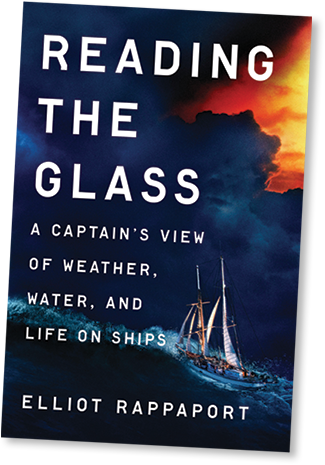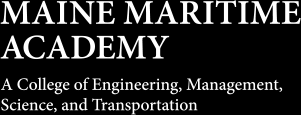In Print
Talk About the Weather
MMA’s own Captain Rappaport shares stories of life on the open sea in new book
CAPTAIN ELLIOT RAPPAPORT, MMA assistant professor of marine transportation, has had a long career on vessels. He trained students to handle sails and sailing ships while scientists taught them oceanographic research. Like many mariners, his time at sea has led to an abiding passion for the science of weather—highlighted recently by the release of his fascinating book, Reading the Glass, published in February by Dutton. The book has quickly attracted praise from a variety of readers: maritime historian Lincoln Paine, author of The Sea and Civilization: A Maritime History of the World, called it “immensely rewarding and entertaining.” Daniel Stone, author of Sinkable: Obsession, the Deep Sea, and the Shipwreck of the Titanic, described it as “full of history, wisdom, and hilarious stories from life on the open seas.”
“Regardless of what part of the maritime world you are in, the sea is a teaching environment.”
Rappaport grew up around boats and boatyards on Cape Cod and came to Maine in 1985 to work in Camden’s windjammer fleet. From there he joined the Sea Education Association (SEA), a nonprofit educational organization based in the scientific community of Woods Hole, Massachusetts that operates undergraduate programs aboard two tall ships outfitted for oceanographic research. When MMA acquired the schooner Bowdoin in 1988, Rappaport joined Captain Andy Chase ’79 to develop a training program aboard the historic vessel. Appointed master in 1992, Rappaport’s career aboard Bowdoin continued until 2002 and included multiple trips to Greenland, Labrador, and the Canadian Maritimes.

Captain Elliot Rappaport. Photo by Stephen Rappaport
“I have always been drawn toward sailing ships and research vessels for the variety of experiences that they offer,” explained Rappaport when talking about how his book came about. “There are a surprising number of MMA faculty who have sailing ships in their backgrounds. Because most of these ships are also training vessels, I think they attract a group of mariners who are already interested in teaching.
“Regardless of what part of the maritime world you are in, the sea is a teaching environment,” continued Rappaport, “You spend a tremendous amount of time learning things and then sharing them with others. I have always been a reader who appreciates good writing. I got into the habit of writing notes—sort of mini-chapters—to share with my students on the topics I was teaching. I never had much interest in straight technical writing, but explaining something interesting, something people might be curious about—that intrigued me.”

Writer and book reviewer Maureen Stanton praises Rappaport’s ability to help “readers visualize and vicariously experience” life on aboard a sailing ship midocean. As an example, she quotes from Rappaport’s book, “Above us a loose skein of clouds is boiling away to leeward, a shaft of sun panning the sea surface behind it like a slow spotlight.”
Rappaport wrote the book for a lay audience interested in maritime life as well as the basic science of meteorology. “I like the stories that stand behind the day-to-day forces that most people don’t give much thought to. Meteorology is a good example of that concept—weather is easy to ignore until it interrupts your plan or threatens you. Aboard a ship, your safety depends on understanding and respecting weather. It’s why we study it, map it, and record it. It’s why people invented instruments to measure it. It is simply impossible to separate sailing from weather, and that means mariners are surrounded by great stories waiting to be told.”
Reading the Glass has an abundance of stories that readers will enjoy.




Post Comment
I have just (reluctantly) put “Reading the Glass” back on my library shelf after finishing this wonderful book! As a land-locked sailor for the past 30+ years, I found Mr. Rappaport’s wide-ranging and highly entertaining treatise on the weather to be a fascinating “read” and very educational in all aspects. His dry and gentle humor is frequently evident and provided lots of smiles to this reader. Many, many thanks for your ability to research such a complex topic and share your knowledge with such readability and clarity – every chapter taught me something new! I hope you will offer another… Read more »
Comments are moderated and will be reviewed prior to posting online. Please be aware that when you submit a comment, you agree to the following rules:
Maine Maritime Academy reserves the right to delete any comment that does not comply with these guidelines and is not responsible or liable in any way for comments posted by its users. If you have a message for the editor, please email mariner@mma.edu.
Campus Currents
View All >Read More
Read More
Read More